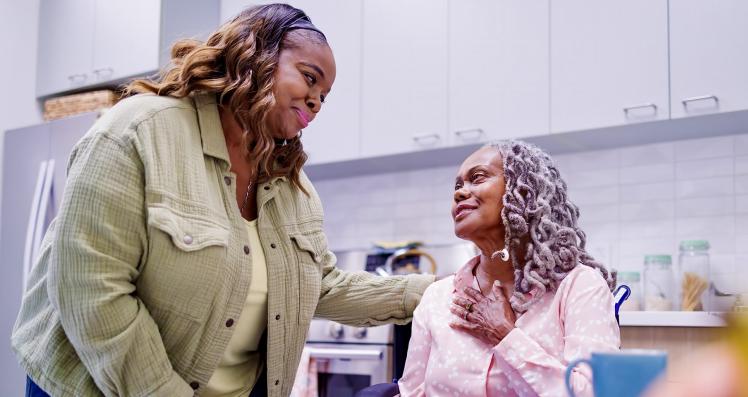
Taking care of an aging parent can be one of the most rewarding yet challenging things a person will ever do. There are many demands and at some point, everyone will need help. As needs increase, so does the importance of outside help. If you live far away, you might be wondering how to get that much needed assistance.
Below, discover tips to help take care of your loved ones, even when you’re far away.
Recruit Eyes and Ears
You can start by reaching out to neighbors, close-by friends, other churchgoers, medical providers, or even check with friends on social media. Could they be your eyes and ears and let you know if something shifts or dramatically changes? Would they be willing to visit and play a game of cards or share gossip over a piece of pie? Many people would welcome additional social interaction. Other family members, like a grandchild or nephew, could also visit and maybe help with grocery shopping.
After a visit, have them give you a quick text or phone call with an update. This way you can ask questions or learn what else might be needed in the home.
Send Needed Supplies
Sending cleaning supplies and groceries is another great way to ensure someone has everything needed to keep the house clean and the fridge stocked. In-home caregivers usually provide light housekeeping including taking out the trash, laundry and doing dishes. But if there’s no laundry soap available, the laundry won’t get done. Check with in-home caregivers for a list of needed supplies.
There are many ways to purchase and send supplies and fresh groceries online. This can mean the difference for a good night’s sleep.
Create a Guide for Caregivers
Create a cheat sheet for professional caregivers to reference. This could include your parent’s history (places lived, jobs held, key relationships, etc.), beloved hobbies, favorite TV shows or movies. Include things that would help a caregiver get to know your parent and engage them in various activities. What are their favorite meals? What don’t they like to eat or drink?
If your loved one approves, including a brief medical history and important phone numbers for yourself, their doctor and other key people in your parent’s life is helpful.
A cheat sheet can really help other caregivers provide robust and engaging care and help keep your parent living independently at home longer.
You, as an important family member, know your parent the most. Sharing likes and dislikes can prove to be the key to happier experiences.
Use Local Resources
You’d be surprised how many local resources are out there for seniors, especially in the East Bay. Some are highly focused, such as cancer support groups or Meals on Wheels, whereas others are more general and operated by the county.
Born to Age magazine offers a comprehensive directory of public and private senior services in Alameda County and Contra Costa County, as well as Napa, Solano, Sonoma and Marin.
There are also many resources listed on the county website where your parent lives. Most counties have an Area Agency on Aging department, which is their arm of the national aging network. They coordinate county services like Meals on Wheels or county homecare programs.
Find Close-by Senior Centers
A quick online search will find several senior centers nearby that offer a full range of services. Some places offer lunches and social activities—a place for your parent to make friends and engage. Other places provide a senior gym and exercise classes designed for older adults. It’s important to find a place that works for your parent in terms of location, services and costs. Many are that low cost are county-supported. Do some research and take a tour on your next visit.
Seniors who have a place to go on a regular basis are happier, healthier and stronger as they stay engaged with life.
Consider a Local PACE Program
PACE stands for the Program of All-inclusive Care for the Elderly and is a national health plan that is run by various organizations across the country. It is designed exclusively for adults over 55 who have multiple preexisting health conditions and are having challenges continuing to live at home. PACE programs work closely with remote caregivers and coordinate all the healthcare and social services. Center for Elders’ Independence PACE program has six centers across the East Bay.
Make a Plan
Being prepared for end of life makes for a smoother end of life experience for everyone. Having a conversation before a significant health event helps you as a family member know what to do. Emotions (stress, fear, anxiety, and/or grief) generally run high during these times. Being able to make “the right” decisions can be difficult if you don’t know what your loved one would want. While this conversation is difficult, it can truly make all the difference.
Questions to ask could include:
- What makes your living worth living?
- Talking to family or friends
- Feeding, bathing and taking care of oneself
- Living without being hooked up to machines
- Life is worth living no matter how sick
- Is it important to pass away at home or at a hospital?
- Is religion or spiritually important? How so?
- If possible, would you want your organs donated?
By learning firsthand how your loved one would handle severe medical challenges, you can far more easily speak to healthcare professionals and guide them accordingly. Be sure to share these learnings with the medical team in advance, in case you are not immediately available to respond. This becomes part of the medical record as an advance directive. Download a California Advance Healthcare Directive (PDF file).
Get Support for Yourself
It’s important for caregivers, regardless of where they live, to find resources to share challenges, ask questions, and get perspective on what may be happening with your loved one. Finding out a certain behavior is “normal” for a certain diagnosis or learning what to expect as a disease progresses can be quite relieving and reassuring. Knowing the “lay of the land” helps ease fears and frustrations.
It’s also important to take time for oneself, whether it’s going to lunch with friends or taking an hour to read a book. Caregiver fatigue is real and if not managed, it could mean the difference between being patient, loving, and kind or missing signs of change. Reach out to friends and talk about other topics besides caregiving. Remember! You have a life outside the home too.
Caregiver support is out there too. There are online and in-person groups just about everywhere and sponsored by disease-related associations, such as the Alzheimer’s Association or Family Caregiver Alliance. There are local chapters throughout the country.
You Can Do It
Depending upon your individual situation, these are just a few ways to support and care for someone far away. Talk to others. Do online searches. Ask questions. Get ideas. Listen closely to those who visit your loved one. Help is here for you and beyond.
CEI: Your Partner for Senior Care
For over 40 years, Center for Elders Independence has helped East Bay seniors—and their loved ones—find peace of mind. Our comprehensive health services include primary care, home assistance, transportation, counseling, meals, social activities, and more. To learn how CEI can help your family, call us at (844) 319-1150.

